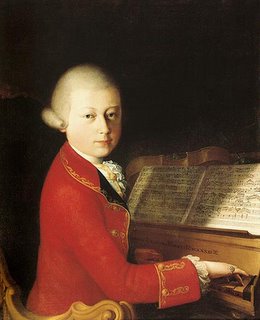
Today is the 250th anniversary of the birth of Wolfgang Amadeus Mozart.
The world is celebrating, as well it should be.
I've just finished listening, over the Internet, to a live concert from Salzburg commemorating the event. Stellar names making great music: Mitsuko Uchida. Riccardo Muti. Gidon Kremer. Yuri Bashmet. Cecilia Bartoli. The Vienna Philharmonic. The program included the "Haffner" Symphony, (where I came in) Exsaltate, Jubilate (Cecilia thrilling in her trilling), a couple of selections from Figaro and Don Giovanni. It ended with the Wiener Singverein giving a rousing, thrill-you-to-your toenails rendition of the closing chorus from The Magic Flute.
But every celebration, particularly if its object is a figure as universally-beloved as Mozart, has to have a Grinch lurking around somewhere, and sure enough, the Mozart jubilee's nay-saying little gremlin is Norman Lebrecht, a critic in the U.K. whose grumpy, sour-note editorial putting down Mozart's music as overrated, make-ya-feel-good highbrow Muzak has been floating around the Internet for weeks now. I'd like to see it go float down the nearest sewer.
Lebrecht tells us, at the close of his screed, that we should forget Mozart and go listen to music that really matters, such as the Shostakovich "Leningrad" Symphony.
Okay, you can find famous Mozart-haters out there. Counting Lebrecht, I think we have three, the other two being Noel Coward, who once described Mozart opera as sounding like "piddling on flannel," and Glenn Gould, who had little use for harmonic structures that emphasised melodic line: he preferred music that put counterpoint first, melody second (if not third.)
There's also been some speculation that he may have suffered from a form of autism. But I'm a Gould fan, so I won't carp. And I do share Gould's affection for Bach and Orlando Gibbons.
But hey, listen up, Norman: even Gould described the Shostakovich "Leningrad" symphony as a "motoric monstrosity."
Again, I didn't sit down here to bash Shostakovich. I like his music. But to imply, nay to state, that he's a worthier composer than Mozart? Here's a guy (Lebrecht) whom I wouldn't be surprised to learn thinks Edward Bulwer-Lytton is a better novelist than Tolstoy.
There are also some extremely-distinguished Mozart lovers out there, including a few who distingushed themselves in other areas than music.
Does E=mc2 ring a bell? http://www.nytimes.com/2006/01/31/science/31essa.html?incamp=article_popular
Lebrecht should find himself another line of work. If they come up with a medicinal treatment for tin ear, he should (1) Undergo it, and then (2) Go out and peddle it, as a penance for sounding like a complete jackass.
Of course, every time the public is unanimous in its claim that something is red, there's going to be someone out there claiming it's green. And it did occur to me, after reading Lebrecht's little down-with-Mozart essay the first time, that he may have been simply playing Devil's advocate, having a bit of ironic fun with all those millions of people out there whose lives have been immeasurably enriched by Mozart's music, and who are virtually unanimous in wanting to celebrate the round-number anniversary of one who, miraculously, gave the world so much joy, laughter, delight and profound beauty.
In other words, maybe he didn't mean it. In that case, I apologize for this screed-in-response.
Then again, maybe he did mean it, in which case I ain't apologizing for anything. You have a tin ear, Norman. TIN. Go take a long walk off a short pier.
The first piece of Mozart's music I ever heard was the Rondo alla Turca from the Piano Sonata K. 311. I was six years old. I heard it in a chamber-music arrangement for a small number of instruments, and it enchanted my child's ear. I played it over and over on the record player in the family living room.
Fast forward to age 29, when I went to see the somewhat-regrettable film Amadeus. (Regrettable because woefully unhistoric.) Still, the music that accompanied the film's closing credits was the slow movement of the Piano Concerto No. 20 in D minor K. 466. I don't usually sit through the sometimes-endless unwinding of credits at the end of films, but that day I sat riveted until the very end. It struck me as the best choice of music for a film moment since Francis Ford Coppola decided to use the Doors' The End for the opening of Apocalypse Now, or indeed since Stanley Kubrick mainstreamed for all time the opening bars of Strauss' Also Sprach Zarathustra at the beginning of 2001: A Space Odyssey.
Go listen to this slow movement sometime. Just put on your headphones and let Mozart make love to your soul for 12 minutes.
This is "Muzak?" Not hardly, as we used to say.
I have often remarked to my friends that, when it comes my time to leave this world, the ability to hear Mozart's music is one of the things I will most regret having to give up. There are plenty of other composers, from Beethoven to Stravinsky, whose music I love, but I can make that statement only about Mozart's music.
And I don't like having my noblest feelings "dissed," Norman.
Arthur Rubinstein, in his memoirs, called music "the dear companion of all my emotions, who can stir us to fight, who can inflame us with love and passion, and who can soothe our pains and bring peace to our hearts." Had he been speaking specifically of Mozart's music, he could have been speaking for me.
So I join the world in celebrating the anniversary of this miraculous birth. And Norman, while the rest of us drink a toast and give our recordings of the "Paris" and "Jupiter" symphonies a celebratory spin, why don't you go put on the "Leningrad" symphony, stick your head between the speakers, and turn up the volume until your neighbors call the cops? Sure, you may go legally deaf from the experience, but it'll be a small loss. You're already tone-deaf.


No comments:
Post a Comment